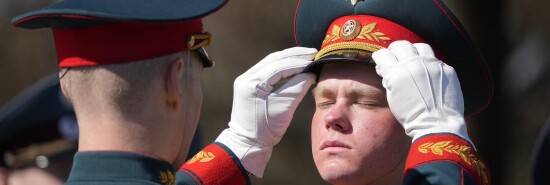
For Victory Day, Russia plays up its pretend connection between today’s Ukrainians and Nazis
Tom Rogan
Video Embed
Russia is hyping the possibility of Ukrainian attacks against its Victory Day celebrations on Tuesday. Victory Day serves as Russia’s annual celebration of the Allied victory in World War II.
Russian President Vladimir Putin’s chief spokesman, Dmitry Peskov, built up the tension, claiming on Monday that the Kremlin is taking “all necessary measures” to protect the celebrations. The events carry special significance in that the peoples of the Soviet Union suffered massive losses against the Nazis. Russia lost more than 10% of its population between 1941-1945, with Belarus losing a stunning 25% of its population.
BLAMING US FOR KREMLIN ATTACK, RUSSIA POINTS THE FINGER AT ITSELF
It’s unclear, however, how real the Ukrainian threat to Victory Day actually is.
From my perspective, it would be a mistake for Ukraine to target the events. Doing so would proffer negligible strategic value to Ukraine’s war effort. But an attack would serve the Kremlin’s interest in presenting Ukraine as an existential threat to the Russian people and nation. Because of Victory Day’s symbolism, any Ukrainian attack would also risk lending support to the Kremlin’s otherwise utterly absurd proposition that today’s Ukraine is a successor to the 1940s Nazis.
Peskov sought to bolster this narrative, claiming, “This year, it is also especially important [to celebrate Victory Day] because, one way or another, we are still dealing with manifestations of Nazism.” In the same manner, last week’s apparent drone attack on the Kremlin may have been conducted by Russia as a so-called “false flag” incident designed to increase Russian support for the war.
Regardless, the Kremlin faces two complications in its effort to manipulate Victory Day for war propaganda purposes.
First, it is Ukrainian rather than Russian forces that hold the clear strategic initiative. A looming Ukrainian counteroffensive is likely to take significant advantage of Russia’s deep vulnerability in force levels and organization, its inadequate ammunition and equipment supplies, and the poor morale of its personnel. Put simply, victory in Ukraine is not on Russia’s horizon.
In addition, the nature of Russia’s war on Ukraine makes clear that the Kremlin, rather than Ukraine, now has far more in common with the Nazis than the Ukrainians. It is Russia, not Ukraine, that launched an unprovoked attack on Ukraine after repeatedly pledging it had no intention of doing so. The Nazis did much the same when they broke the Molotov-Ribbentrop pact and invaded the Soviet Union in June 1941. It is Russia, not Ukraine (with a few exceptions), that has used terror tactics, such as shelling apartment buildings. The Nazis did much the same as they rampaged through Soviet territory. And it is Russia, not Ukraine, that is waging war to establish a new imperium. The Nazis did the same when they sought to turn the Soviet Union into a farm-factory territory and enslave its people.
Ukraine may or may not attempt to target Russian interests come Tuesday. But the Soviet victory over the Nazis in 1945 has very little in common with the situation Russia faces in Ukraine in 2023.
